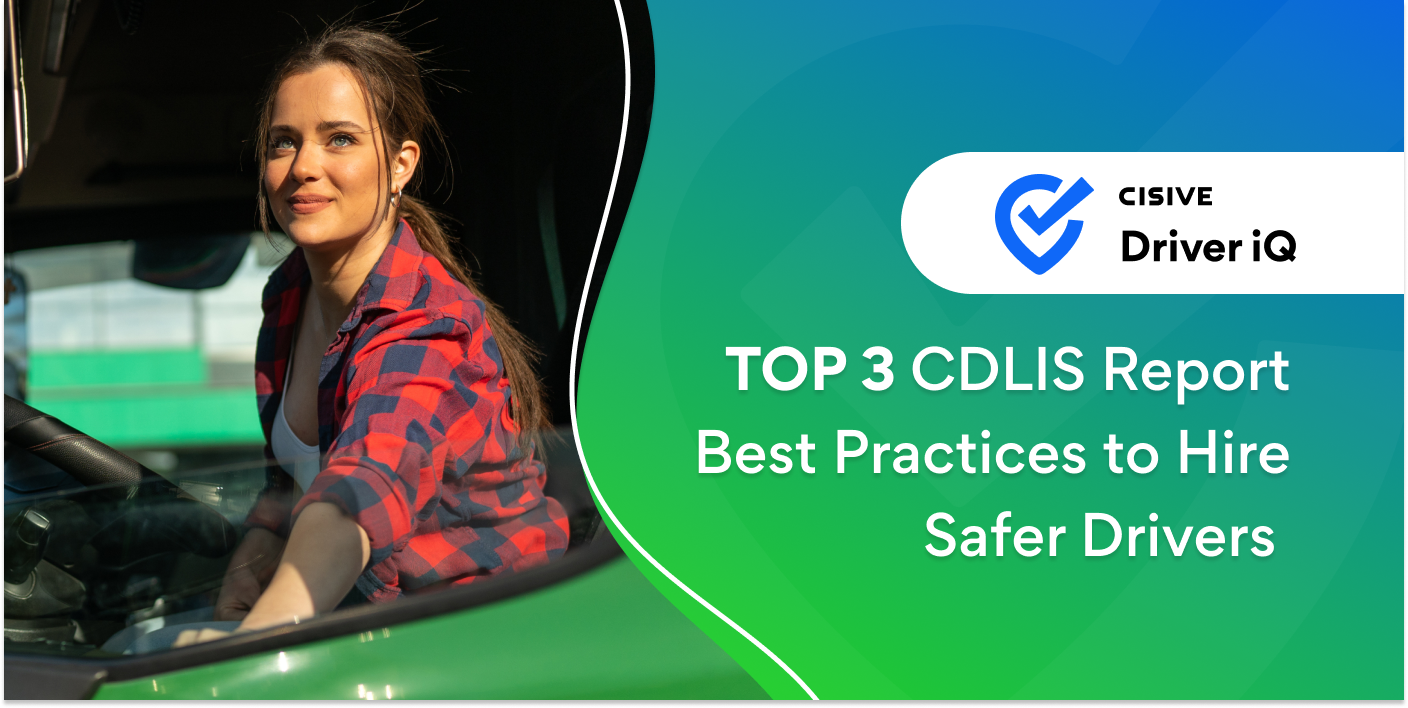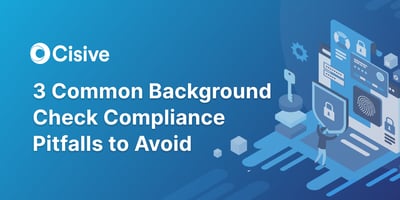

In transportation, there are four reports that most employers will request when reviewing...

Every company employing drivers needs to make sure they’re hiring qualified, safe motor vehicle operators. Fortunately, there are multiple ways to get this information, including the Commercial Driver’s License Information System (CDLIS). A CDLIS report helps you ensure that your drivers are properly licensed and safe operators so you can stay in compliance with state and federal regulations.
Learn more about how to get a CDLIS report, best practices for using it in hiring decisions, and why they are important for compliance.
Key Takeaways:
|
CDLIS is a nationwide database made up of state records relevant to the identification and licensing of commercial motor vehicle operators. The CDLIS contains information about commercial drivers, including their license records. The CDLIS system helps verify that each commercial driver has only one current CDL, as well as one complete driving record.
The American Association of Motor Vehicle Administrators (AAMVA) operates the index on behalf of all 50 states and the District of Columbia, while the Federal Motor Carrier Safety Administration (FMCSA) monitors the operation of this system and authorizes users to access the CDLIS.
State driver licensing agencies use CDLIS to respond to requests for information, upload pertinent information on commercial drivers, and transfer driver license records when people move to another state.
A CDLIS report is a comprehensive record of an individual's CDL status and history. Federal law requires drivers to have a valid, current CDL to operate commercial vehicles. Additionally, drivers aren't permitted to hold a CDL from more than one state at a time.
A CDLIS report includes details such as:
Employers, law enforcement agencies, and state licensing authorities often use CDLIS reports to verify a commercial driver's qualifications and ensure compliance with licensing requirements.
CDL records contain sensitive personal identifying information, such as Social Security Number and date of birth, and are protected by the federal Drivers Privacy Protection Act.
For that reason, motor carriers or other transportation employers aren’t authorized to access reports directly through the CDLIS-Gateway (AAMVA) until they provide required driver consent documents. As this incurs additional investment for the employer to maintain an integration, it is more cost-effective to use an authorized third party to request CDLIS reports on your behalf.
Since CDLIS reports can be challenging for employers to access on their own, engaging a background screening partner can simplify the process. Look for a partner with expertise in transportation industry-specific screening, including CDL verification, endorsements, and compliance with Department of Transportation regulations.
The partner should offer a comprehensive range of services and have a reputation for reliable and timely results. High-quality background screening providers will maintain data accuracy, ensure data security and privacy compliance, and provide efficient reporting.

Employers hiring licensed drivers can use multiple screening reports, including CDLIS, the FMCSA’s Pre-Employment Screening Program (PSP), state motor vehicle records, and previous records of employment. Here's what you need to know about each type of report.
The CDLIS is the most direct way to ensure that a commercial driver only has one CDL and one complete driver record. Verifying this information helps employers stay in FMCSA compliance and avoid costly penalties. If you discover that a driver has past or current driver’s licenses in multiple states, you can ask for the relevant state motor vehicle records.
A FMCSA rule change that took effect May 9, 2022, requires that motor carriers examine the previous three years of licenses held by a driver, an increase from one year. The CDLIS report, while not required, helps employers thoroughly vet the credentials and safety of incoming and current drivers.
The PSP provides access to the safety records stored in FMCSA’s Motor Carrier Management Information System (MCMIS). The MCMIS is a federal database and is distinct from state-level motor vehicle records databases. Carriers, commercial drivers, and third-party service providers for the transportation industry can request these safety records.
PSP records include details about crashes, including what carrier the operator was driving for and whether injuries or fatalities occurred. Inspections, meanwhile, reveal whether vehicles remained in service, among other details.
PSP reports may contain a statement verifying whether a crash was preventable. These reports will also show violations found in inspections disclosed by previous employment to prospective employers.
A PSP report doesn't contain a score, although information found on a PSP will be used to determine a carrier’s Compliance, Safety, and Accountability (CSA) score. CSA pulls from roadside inspections and crash data from the previous five years for preventable DOT accidents and three years for inspections
States issue driver’s licenses, including commercial driver’s licenses. They are a natural place to go for information about an employee or applicant’s driving record. Motor vehicle records provide an individual’s driving history from the relevant state Department of Motor Vehicles. Motor vehicle records are also helpful for employers to vet employees who will operate motor vehicles on company time but don’t need a commercial license.
These records generally include information including:
Motor vehicle records may also inform employers about a candidate’s accident history, license violations or suspensions, convictions related to motor vehicle operations, and driving record points, if applicable.
The FMCSA requires all employers to conduct a pre-employment screening. This includes asking for and reviewing motor vehicle records in every state where a driver has held a CDL within the past three years. After a driver is hired, employers must review updated motor vehicle records each year to determine whether the driver still meets standards.
Ordering state motor vehicle records is important to regulatory compliance, reducing risk, maintaining safety standards, and upholding your organization’s reputation.
Under FMCSA guidelines, transportation companies are required to verify employment history for the previous three years for people applying to operate a commercial motor vehicle. A previous record of employment (PRE) report contains employment records, as well as driver school record verification from many schools across the U.S.
While a driver’s employment record can be challenging to pull together manually, a background screening partner specializing in transportation can help.
CDLIS reports are a valuable resource for transportation companies to verify the qualifications, endorsements, driving history, and compliance of truck driver candidates. By leveraging this information, companies can make informed hiring decisions, enhance safety, and reduce the risk associated with hiring unqualified or unreliable drivers. Here are four benefits of running CDLIS reports.
A CDLIS report allows companies to verify the authenticity of a candidate's CDL credentials. These credentials can then be used to order an MVR report, which includes details such as issue and expiration dates and the license class. You can then be confident that candidates you hire meet basic qualifications for the position.
One of the top violations cited by the FMCSA is drivers operating with suspended or revoked licenses. The average fine for such violations is nearly $9,000. These fines are preventable by running CDLIS reports and following related compliance rules.
Once a CDLIS report has been obtained, a prospective employer can then run an MVR report for the following:
MVR reports provide information on endorsements or restrictions associated with the driver's CDL. For example, you can see whether a driver has specialized endorsements for hazardous materials or passenger transport. This information is crucial for matching drivers with specific job requirements and responsibilities.
Restrictions typically depend on what vehicle type the driver used for their CDL skills test. Drivers who took their test in a vehicle with air over hydraulic brakes, for example, will be restricted from operating a vehicle with full air brakes.
Employers can review the candidate's driving history, including past violations or suspensions related to their CDL. This insight helps employers assess a driver’s road safety and reliability.
Hiring drivers with clean CDL records and a history of safe driving practices is essential for promoting safety within the company and on the roads. MVR reports help identify candidates with a track record of responsible and safe driving. This reduces the employer’s risk from accidents, especially those where your driver is at fault.

CDLIS reports can provide key candidate information to help you make better hiring decisions. Here are three best practices for using that information appropriately.
Always obtain written consent from the candidate before requesting a CDLIS report. This ensures compliance with privacy and consent requirements. Driver consent forms must be signed before (or the same day as) when a CDLIS report is run. CDLIS/AAMVA run regular audits to verify that consent requests, including forms, are in compliance.
In some circumstances, you may obtain verbal consent to authorize a CDLIS report, but you must have prior, written approval documented by CDLIS/AAMVA.
Unless otherwise noted, when pulling private information on a candidate, follow Fair Credit Reporting Act rules and regulations — especially when using a third-party provider to access private data. Inform candidates that you may use the information revealed in their report to make hiring decisions. Provide them with a copy of the report, information on their rights as consumers, and contact information for your background screening partner.
By setting clear and well-defined criteria for hiring decisions, you can streamline the CDLIS screening process while staying in compliance.
Begin by defining the specific roles within your organization that require a CDL, along with minimum qualifications, such as the required class of CDL and endorsements that align with those roles. Clearly outline what counts as an acceptable driving history, including criteria for evaluating violations and suspensions you uncover.
Here’s an example: A CDLIS report points you to an MVR report, which reveals that a job applicant’s license was recently suspended for driving under the influence. This suspension raises concerns about the driver's safety record and their ability to follow traffic laws and company safety policies.
When reviewing past violations or issues, conduct an individualized assessment to allow candidates to explain mitigating circumstances.
CDLIS reports provide essential information about a candidate's CDL. However, state motor vehicle records provide a broader picture of the candidate's entire driving history, including noncommercial driving. By evaluating both sources, talent acquisition leaders can conduct a more comprehensive assessment of a candidate's overall driving record.
Comprehensive background checks, which include criminal history and employment verifications, further enhance the hiring process by identifying red flags that aren’t raised in driving records alone. This approach helps hiring teams assess a candidate's overall suitability for the job role.
FMCSA DOT reports provide a critical window into pertinent criteria for hiring decisions, such as a candidate's qualifications, endorsements, and restrictions. However, the process of requesting and interpreting FMCSA DOT reports can be intricate. You need to be precise, thorough, and adhere to legal requirements. That's where having a trusted background check partner becomes indispensable.
A reliable background check partner not only provides the expertise for how to get a CDLIS report but also ensures that the process is conducted in strict compliance. A specialized organization, like Driver iQ, empowers your talent acquisition teams to make informed hiring decisions, prioritize safety, and remain in compliance. Speak to a pro today to get started.
Author: Cisive Staff
Bio: Contributed by a member of our staff with expertise in background screening for highly regulated industries.
Let's Connect on LinkedIn
In transportation, there are four reports that most employers will request when reviewing...

Employers use background checks to protect their workforce, customers, and the business from risk....

In transportation, there are four reports that most employers will request when reviewing...